

Nutritionist, Kansai Memorial Hospital
Sponsored by the Hirakata Rotary Club
To the members of D-2660
Thank you so much for allowing me to participate in the GSE program. I was
very lucky to notice a small advertisement in the newspaper stating that the
Rotary was looking for people to take part in "vocational study."
When I learned that I had been selected, I was overcome with feelings of unbelief,
joy and uneasiness, and even now I can feel those same emotions welling up within
me as I write my report.
I want to express my gratitude to Governor Inoue and all the members of the
GSE Committee, as well as to all those at my sponsoring club who had a part
in helping to make the program a success. I also want to thank all those in
the Rotary who handled all the paperwork and other arrangements.
My home stay experiences : reflections and impressions
I was able to get a glimpse of the daily lives of British people by staying
with seven different families, each of which had a different type of home atmosphere.
I could have a variety of experiences and discover many things about life in
England. I was so thankful that my host families spoke in easy-to-understand
English because my English is not very good.
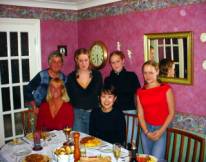
It was nice that I could meet many different host families, but it was unfortunate
that by the time I was just getting used to their way of speaking, I had to
move on to my next homestay. I think it would have been good to have had more
time eating and talking with my host families. I would like to share a few of
the things I learned and felt during my homestays.
* I was surprised to learn that among the British, there are those who know
about Tokyo but not about Osaka. I guess it's because England is so far from
Japan.
* It may be because of the frequent rains, but there were some families who
did not have the habit of hanging their laundry outside to dry. It was a bit
of culture shock for me to learn this. It was also amazing to me that there
were no launderers in the city.
* I had heard that the weather in England is rainy and cold, but we had beautiful
weather during our stay. It was warm enough for me to get by wearing a long-sleeve
blouse and no coat.
* England's latitude is considerably farther north than Osaka, so I was surprised
to hear that it rarely snows there. This is due, it seems, to the fact that
there are warm sea currents nearby.
* England has much natural beauty and many rolling hills, but there are almost
no mountains higher than 1,000 meters, so even if it does snow (which is rare),
there is nowhere where the British can go skiing, which surprised me.
* All the homes had dishwashers, washing machines and dryers, but it was amazing
to me that Washlette-style toilets (these are popular in Japan because there
is no need for toilet paper; the toilet washes with warm water and blow dries
when finished) are unheard of.
* Before going to England, I had no idea that Japanese appliances and automobiles
were so common there.
* I think it was a good thing that the elderly and physically-challenged were
making serious efforts to get outside, and I got the impression that England
is far ahead of Japan when it comes to barrier-free design. I felt that England
is a country that places much value on old buildings and artifacts, and on old
furniture and ornaments. I had thought that the British drank only tea, but
everywhere I went I saw people drinking coffee.
* Cereal is the main food at breakfast, but many people eat potatoes at lunch
and dinner. Sometimes they ate grilled, fried, boiled, and mashed potatoes during
the same meal. My eyes bugged out when I saw that! It seemed to me that the
potato is the staple food of England.
* The main meats served in England are lamb, chicken, beef and pork. They enjoy
turkey and pheasant seasonally. Unlike the past, when people were very concerned
about the BSE problem, it seems that people don't worry about it much anymore.
Although chicken is used quite often in cooking, there is almost no custom of
eating eggs, and eating them raw, like we do in Japan, is unheard of. It seems
that the reason for this is apprehension about the possibility of salmonella
bacteria finding their way into the egg when the shell is cracked open.
* Visiting an elementary school: I have fond memories of going with my host
children to their elementary school and talking to the students about Japan
and teaching them how to make origami.

Reflections:
I often wished that I could speak English better. I should have done more to
improve my English before going to England. I was irritated and upset with myself
many times because I could not express myself appropriately. I felt keenly the
truth that words are a very important tool in helping to bind people together.
Places I visited for sightseeing
* Dunham Park and Gardens
I was impressed by the extremely large park and the buildings that I saw at
this place. Dunham Park and Gardens is managed by the National Trust, and I
think it is wonderful how this private, non-profit organization is working to
preserve England's historical buildings and natural beauty for future generations.
I heard that there are over 2.6 million members, and it is easy to see just
how many people in England love their country and its lands. Dunham Park and
Gardens was the first place I visited after arriving in England, so I remember
it very clearly.
* Sightseeing in Manchester
We went by train, and since we almost always went places by car, it was refreshing
to be able to take a train. The Rotarians who went with us were great guides
and explained things in great detail. We saw city hall, the library, churches
and other historical sites. I was very thankful for their easy-to-understand
explanations. It was a great day.
* Chatsworth House
This building, which looks just like a castle, is located in the middle of a
vast, grassy park (lawn). Everything in Chatsworth House is valuable, and there
were many paintings, decorations and pieces of antique furniture. I was shocked
to learn that the entire place is privately owned by an aristocratic family.
It was very easy to understand about its history because there was a Japanese
guide tape provided for Japanese tourists.
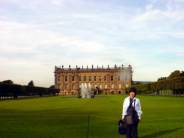
* Ryme Park
Ryme Park is another place that is managed by the National Trust, and I was
overwhelmed by the vastness of the wide open natural beauty. We had great weather
and it turned out to be a sort of trekking day for us. It was wonderful being
able to see the scenery from a slightly elevated spot, and we were even able
to see Manchester in the distance across the green fields. There was no way
to get the whole image in the viewfinder of my camera. It is the kind of place
one appreciates with their entire body. The sheep came very close to us and
they were cute and a bit scary.

*WEDGEWOOD POTTERY:
I could watch the entire production process from start to finish, including
the painting of the finely detailed pictures on the pottery. Since it was all
done by hand, it was possible for me to watch carefully as everyone did their
work. I realized that it can't be helped if prices are a bit high, considering
the amount of work that goes into making a single piece of pottery. When I went
to the gift shop to look for a souvenir, the shop was filled with Japanese tourists
who were on a package tour, and the place looked just like a busy Japanese shopping
center.
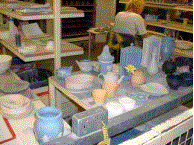
My experiences and things I gained from my vocational study trips
*TRAFFORD GENERAL HOSPITAL:
I was able to talk to nutritionists there about their work, walk around the
hospital, and stand by the beds as the nutritionists talked with their patients.
Our GSE team leader came with me on my first study trip. The young hospital
workers spoke so quickly, so I was a bit uneasy at first because it was hard
for me to understand what they were saying.
I was very surprised by the size of the hospital (1,000 beds). In England,
many hospitals are affiliated with the National Health Service. The majority
of the hospitals are public hospitals, so the medical fees and fees for those
who must stay in the hospital are free. There are some private hospitals, but
they are quite expensive. Patients receive very prompt care at private hospitals,
however, so most of those who go to them are wealthy.
In England, a nutritionist's work is very specialized. For example, there are
nutritionists who specialize in diabetes patients, patients with high blood
pressure, tube feeding, etc. Whatever their specialty, the nutritionists are
very knowledgeable in their field of expertise, and they work together with
the doctors and nurses as a team. They use the same chart for their patients
that the doctors and nurses use, and they work together very efficiently. In
Japan, such teamwork between doctors and nutritionists is still rare, and I
was very envious of my British counterparts.
* STOCKPORT PRIMARY CARE TRUST:
I accompanied the Food & Health Programmers Manager of Stockport Primary
Care Trust when he attended a meeting called the "Stockport Healthy Living
Scheme." This occupation does not exist in Japan, and I thought it was
a daring and extremely attractive occupation. In England, nutritionists work
with patients in hospitals, but food and health care programmers work to promote
healthy living at local companies by encouraging the workers to eat healthily
in order to prevent illnesses.
At the meeting, nutritionists, nurses, exercise therapists, psychological therapists
and teachers gathered for a panel discussion, the goal of which was to consider
a 10-year plan whose focus was "How to get the citizens of Stockport to
live in a healthy manner." The goal was to discuss this theme from a variety
of angles (i.e., from the various viewpoints represented by the different fields
of expertise represented at the meeting). They feel that if people continue
to eat properly, get moderate exercise and do not smoke, they will be able to
live healthy lives. Since there were school teachers present at the meeting,
it seemed to me that in Stockport the schools were also aggressively pursuing
the development of good eating habits among the children. One of the problems
facing children in England right now is the increase in adult diseases, and,
in order to promote good health, schools are distributing cards and stickers
to the students that illustrate the importance of eating fruits and vegetables.
Considering the fact that more and more young people in Japan are growing accustomed
to eating fast food, this is certainly not a problem that does not affect us.
In Japan, people are consuming too much fatty food. Our caloric intake and sodium
intake is too high, and it is causing more and more illness. I am quite worried
about this trend. I think the approach I saw in Stockport is one from which
we can learn many things.
*TAMESIDE GENERAL HOSPITAL:
I was able to visit with a personal nutritionist who works with diabetes patients
in the outpatient wing of Tameside General Hospital. The first thing diabetes
patients do at Tameside General is meet with a nutritionist and get nutritional
guidance (which is related to their eating habits) based primarily on their
test results. In particular, they receive leaflets and other information, which
the nutritionist discusses with them.
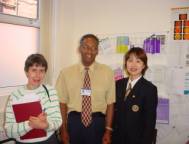
In the diabetes department at Tameside General Hospital
They are also weighed, and their family members are allowed to sit in on the
nutritional guidance with them. Next, a nurse helps them with their blood and
urine testing. If necessary, they will also see a doctor. It was a very efficient
process, in my opinion.
*LEIGHTON GENERAL HOSPITAL:
This hospital has 700 beds and a staff of more than 2,000 doctors, nurses, PTs,
and maintenance and management staff, etc. There are 17 nutritionists on staff,
and I was able to accompany several of their specialists around the hospital
during my visit. They were specializing in diabetes, high blood pressure, elderly
patients, tube feeding and children's illnesses.
I was also able to look around their kitchen facilities. The kitchen was quite
large and bright, but the layout and equipment were not all that different than
what we have in Japan (see photo below).
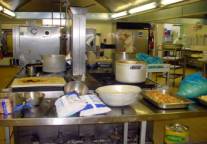
The patients are able to choose the meals they want, however. When they get
their lunch, they get that evening's meal menu card to fill out. This card is
picked up with their tray after their meal. It seemed like an ideal system to
me.
In the same way, during dinner, they get a menu card for the next dayユs lunch.
In Japan, it is considered a matter of course that the hospital serves a set
menu and the patients have no say in what they eat, so I was quite shocked by
this approach. There are many patients in the hospital who look forward to their
meals more than anything else, and I think it would be a source of great happiness
(and do much to lift the spirits and improve the condition) of such patients
if they were able to choose what they want to eat.
I also had the opportunity to spend some time with a nutritionist (a tube feeding
specialist) when she went out to a nursing home to see her patients. Since there
is no full-time nutritionist working at this home, she goes there once a week
to check on the condition of the residents. The nutritionist decides on the
content and drip speed of the feeding mixture. First, she talks to the nurses
to find out how the patients are doing. Then she goes to their bedside and carefully
checks to see if there are any problems with their intestinal feeding tubes.
In England, nutritionists are allowed to change the feeding tubes by themselves
if need be. I was very surprised and impressed to see this because, in Japan,
things are so over-regulated regarding the care given to patients.

I was also able
to visit a clinic that is affiliated with Leighton Hospital. They don't have
a full-time nutritionist, but the hospital sends out nutritionists to visit
the clinic regularly. Maybe it is because the scale is small, but all the staff
were friendly towards one another and the place had a very at-home atmosphere.
They have their own swimming rehabilitation room and pool and their own kitchen.
It was a nice, fully-equipped facility, and it didn't look like a hospital at
all. I have heard that the root word for hospital is "hostel." To
be sure, this clinic had such an atmosphere. Hot meals were brought to the rooms
on push-carts, and, to me, it seemed to be an ideal environment for the patients.
Experiences and memories from the District Conference
About 700 Rotarians and Rotarian couples gathered for two nights and three
days at Southport for the annual District Conference. I was surprised and overwhelmed
by the scale of the gathering. Our GSE team did a performance of driving away
demons by throwing beans (a traditional Japanese custom celebrating the beginning
of spring). During our performance, our motions were not in sync with the music,
and there was a short time when we had to stop our motions because there was
no music playing. But, we were able to finish our performance without any serious
problems. I think we were saved by the fact that the audience enjoyed it when
we threw beans out into the audience. Getting to perform in front of everyone
there was an invaluable experience for me.
Besides the main subject of the conference and the various speeches, there
was a dinner and dance party. This party was held the night before the conference
opened, and it was a very exciting evening with the jazz accompaniment. I think
I was able to understand one of the reasons that the Rotarians look forward
to having the District Conference every year.
Another good memory for me was having the chance to dance with the Northwich
Vale Royal Rotary members. At that dance, music by ABBA was played and I grew
to like their music. After returning to Japan, whenever I hear ABBA's music,
it reminds me of England, all the wonderful people who were so kind to me there,
the things I experienced there, and the scenery I saw.
What we can do to help when the English GSE team comes to Japan
I am planning to go along with the GSE team when they go sightseeing, if my
schedule permits it. I want them to appreciate not just the spectacular scale
of the buildings in Osaka, but also the beauty of the old, historical places
like Kyoto and Nara. It is possible that the team members will want to rest
on their free days, but if they are interested in going out and doing something,
I am open to going jogging or going out to eat with them. They are accustomed
to going places by car, but I would like them to get a taste of what it is like
in Japan, where we often make use of trains and buses in our daily lives. Also,
since the British are almost completely unfamiliar with Japanese cooking, I
hope that they will try all kinds of Japanese food, and I am looking forward
to seeing just how much they will like Japanese cuisine.
Some advice for future GSE team members
Before we left for England, a former GSE team member said to us, "Make
the most of every minute and every second." It is just as he said. The
things you will experience are unlike what you can experience in your daily
lives, and I think GSE team members should eagerly try to experience and do
as many different things as possible. I think that getting together with the
other team members to prepare and practice the group presentation is a very
important part, an indispensable part, of being a GSE team member.
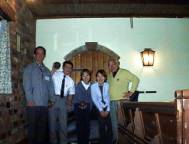
Practicing our presentation at Rtn. Glenn Millarユs home
In my team's case, we got together with our team leader in order to put together
our presentation. We had many opportunities to get together to write and translate
our presentation (and polish up the English), and to compose our presentation
in Power Point. I think we were able to come up with a powerful presentation
that gave the audiences a good introduction to Osaka and Japan. Also, by getting
together often and working together on the presentation, we were able to develop
and nurture deep communication between team members and it resulted in good
teamwork that was nothing to be ashamed of.
When you go to another country, you have to deal with jet lag, and it is sometimes
easy to experience health problems from the stress of having to live in a foreign
country and speak a foreign language. For this reason, you need to pay close
attention to your health so that you can have a successful GSE program.
In conclusion
My four weeks in Manchester, England were extremely meaningful and substantive.
I have many more years to live and work as a nutritionist, and I think the things
I learned and experienced on this trip have expanded my outlook considerably.
Everything I experienced will become a vital part of my life and work. I also
learned about the importance of developing deep bonds between people and about
the warmth and richness of the human heart. I can't help but be thankful for
all these things every day.
I am thankful not just to the many Rotarians I met, but also to our team leader
and all my team members. They all helped me in so many ways. I am filled with
gratitude to each of these people. It is indeed true that the truly important
things in life, even though we cannot see them with our eyes, are "spirit,
sincerity and love." Thank you to everyone!
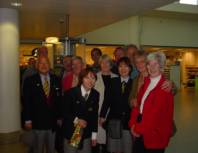
With Rotarians I met, who came to see me off at Manchester Airport
My Host Families in R.I. D-1050
(Name・E-mail・Address)
Chris & Pam Boyes
chris@insurer.com
Gordon & Gill Parkin
gordon.parkin@gp-p88007.nhs.uk
Murtaza & Dorothy Husaini
MURTAZAHUSAINI@msn.com
2 Sharon Avenue, OL4 4HP
David & Jean Hurlston
d.hurlston@btinternet.com
24 Taunton Lawns , OL7 9EL
Simon & Marcia Yates
Syates3880@aol.com
Brett & Gerdi
brettandgerdi@diener.freeserve.co.uk
Jerry & Diana Park
Park50@hotmail.com
Lane End Cottage, Audlem Road, Nantwich Cheshire CWS 7QJ